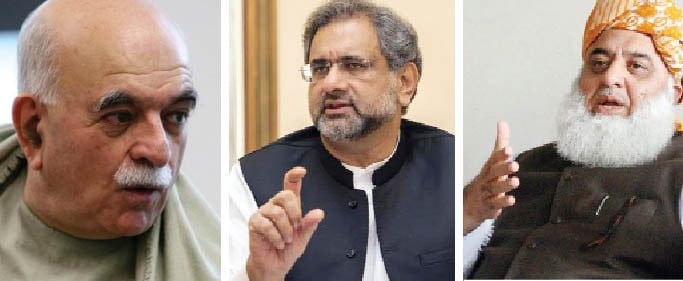
The next elected government will now make and implement the final decision on the merger of Fata, and hopefully whichever party comes into power will not roll back the reforms

The ruling Pakistan Muslim League-Nawaz (PML-N) could have claimed credit for proposing and implementing landmark reforms in the long-neglected Federally Administered Tribal Areas (Fata) had it not been hampered by two of its closest political allies.
It would now be able to claim only half the credit for initiating the Fata reforms in 2016, but then slowing down in the implementation stage due to political compulsions. In fact, the PML-N is facing criticism for lacking the political will to take the process to its logical conclusion. Ironically, critics even accuse the PML-N of using its two main political allies to sabotage the Fata reforms.
All attempts by the PML-N-led federal government to persuade Maulana Fazlur Rahman, head of the Jamiat Ulema-i-Islam-Fazl (JUI-F) and Mahmood Khan Achakzai, leader of the Pakhtunkhwa Milli Awami Party (PMAP), to agree to the merger of Fata with Khyber Pakhtunkhwa province have failed. Even last-minute efforts by Prime Minister Shahid Khaqan Abbasi before the end of the government’s five-year term to implement certain reforms had to be kept on hold as the PML-N couldn’t afford to antagonise the JUI-F and PMAP.
The PML-N is short of allies in the fast-changing political situation on the eve of the July 2018 general election and the loss of its existing partners would further weaken it at a time when its founder, deposed Prime Minister Nawaz Sharif, has been disqualified for life and some of its lawmakers are abandoning it due to their belief that it is unlikely to return to power.
There is no doubt that despite opposition by its allies the government was able to push certain reforms, including the extension of the jurisdiction of the Supreme Court and Peshawar High Court to Fata by ensuring the passage of a bill in the National Assembly and Senate, and scrapping the Agency Development Fund that was the exclusive domain of the political agents and a source of corruption. However, it couldn’t build the much-needed consensus for Fata’s merger with Khyber Pakhtunkhwa. Earlier, it tried and failed to replace the controversial Frontier Crimes Regulation (FCR) with the contentious Rewaj Act, which faced stiff opposition for being not much different than the FCR. Finally, it decided to extend the superior judiciary’s jurisdiction to Fata so that the FCR could be scrapped, though time and resources are needed to set up the new judicial structure and make it work.
Though Prime Minister Abbasi has committed that Fata would be provided around Rs100 billion a year for the next 10 years as proposed by the Sartaj Aziz-led Fata Reforms Committee to accelerate the pace of development in the tribal areas, it is unclear if the federal government would make available the money or the four provinces have agreed to reduce their share in the National Finance Commission (NFC) award so that Fata could get its promised three per cent share in the award. Only the Pakistan Tehreek-e-Insaf (PTI)-led Khyber Pakhtunkhwa government until now had expressed willingness to a cut in its share in the NFC award for the sake of Fata.
Though this step was appreciable, it wasn’t unexpected as Fata eventually and hopefully would merge with KP and the amount given up by the latter from its share in the NFC award would thus be spent in the same province.
Another concern is the lack of capacity of the existing Fata Secretariat to spend the funds that should be coming its way in case the promised special funding of Rs90 to 100 billion is made available to the tribal areas. In the current Annual Development Fund, Rs24.5 billion was budgeted for Fata, but Rs10 billion is unlikely to be spent in the remaining period of this fiscal. One excuse often given is insecurity, but the main cause of the Fata Secretariat’s inability to spend the sanctioned amount is lack of capacity. The capacity-building would have to be undertaken on a large scale on an urgent basis if the special funds amounting to almost Rs100 billion have to be spent in time.
The merger issue is hanging in the balance, though the government has been confidently saying that it would be accomplished now by spring next year instead of the five-year transition recommended by the Fata Reforms Committee. In fact, some of the steps already under implementation are inevitably leading to Fata’s merger with Khyber Pakhtunkhwa. Still the task of making and implementing the final decision on the merger would have to be taken by the next elected government. Whichever party wins and comes into power, the Fata reforms process underway won’t be rolled back. All major parties that are in a position to win the polls, including not only the PML-N but also the PTI and Pakistan People’s Party (PPP), are committed to the Fata reforms and backing out from the commitment even if they have very demanding allies won’t be easy.
Though the people of Fata as in every general election would elect 12 members of the National Assembly in the July polls, they would get another opportunity to vote in the proposed local government elections in October this year. And then hopefully in 2019 the Fata voters would elect 23 members to the Khyber Pakhtunkhwa Assembly.
Obviously, this would become possible once the merger issue is resolved and Fata becomes part of Khyber Pakhtunkhwa. If all the three timelines of elections are held as planned, the Fata people would become stakeholders in elected bodies at the local, provincial and federal level -- and benefit like never before.